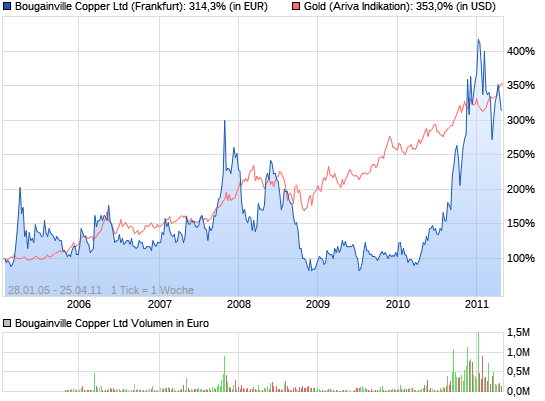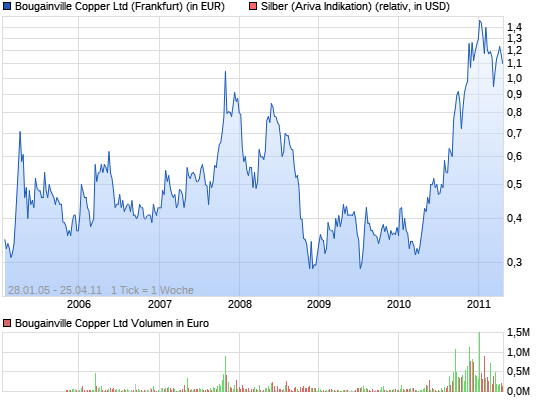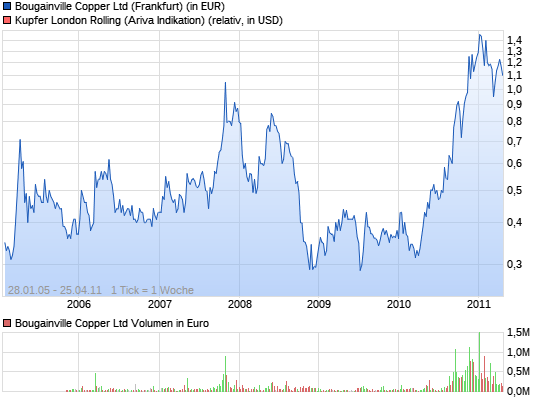Trading Bougainville Copper (ADRs) 867948
Seite 344 von 990 Neuester Beitrag: 18.07.25 15:22 | ||||
| Eröffnet am: | 29.09.07 00:25 | von: nekro | Anzahl Beiträge: | 25.735 |
| Neuester Beitrag: | 18.07.25 15:22 | von: Ice-Nine com. | Leser gesamt: | 7.023.384 |
| Forum: | Hot-Stocks | Leser heute: | 3.937 | |
| Bewertet mit: | ||||
| Seite: < 1 | ... | 342 | 343 | | 345 | 346 | ... 990 > | ||||
By Cole Latimer on 21 April 2011 0 comments Bougainville Copper is considering re-opening its copper in Papua New Guinea.
The mine was originally forced to close due to civil war on Bougainville Island, which left thousands dead, according to the ABC.
This forced the miner to shut down operations in 1989.
However, land owners have called for the mothballed mine to be re-opened, to provide funds for Bougainville’s independence movement.
Peter Taylor, chairman of Bougainville Copper, welcomed the move by the islanders, adding that the election of a new president last year was a crucial factor in the re-negotiation of the mine’s re-opening.
Initial estimates put the re-commencement of the mine at around $3 billion.
Quelle australien mining
MADANG Chamber of Commerce president has expressed concern on the state of developmental growth in other provinces, particularly the growth seen in beautiful Madang as compared to those seen in Kokopo during the recent PNG Indigenous Business and Trade Expo Summit a fortnight ago.
Stotick Kamya, who spoke of the changes there, said it was an eye-opener for the 80 Madang delegates who could not believe the pace of change and said it was embarrassing comparing the province’s growth to Kokopo and Rabaul in East New Britain.
“Rabaul is moving 200 miles per hour in terms of implementing changes by having what is called a ‘growth centre’ for each district and local level government.
“That is turning the villages into modern small cities all having easy access to basic public amenities,” he said.
He said that he was amazed at how basic government services such as roads, bridges, electricity and others reached those places.
“I was surprised to see only three people working in the provincial government office, with the bulk of the public service machinery located in their respective wards, councils and LLGs, unlike here in Madang.
“The roads are double and triple-lane, there are street lights everywhere, the drainage, markets and even the public toilets were spotlessly clean, leaving a lot to be desired here considering they have no fencing at their market place,” Stotick said.
He said Madang, which will become the mining and fishing hub of the Momase region, “must follow the footsteps of Kokopo where it is evident there is the collective working of the national, provincial and council members all with the same aim of developing their province”.
He said that Madang still had a long way to go.
After the trip, serious talks have surfaced to adopt policies on how to get the provincial government to work closely with all stakeholders to enforce some changes.
“Theirs is not only a shift in paradigm but there is also a change in the people’s mindsets.
“If people in Madang started having a shift in the way they think and conduct their activities, Madang will surely develop for the better.
“East New Britain has already achieved the government’s Vision 2050 well ahead of other provinces.
“It is a shame to see some of us still struggling when we have all the minerals and resources whereas ENB only depends on an agricultural economy,” Stotick stressed.
von Thomas Godt
Donnerstag 21.04.2011, 10:52 Uhr
London (BoerseGo.de) - Der drei-Monats-Kontrakt an der LME kann seine Gewinne vom Vortag am Donnerstag weiter ausbauen. Mit 9.638 US-Dollar je Tonne kostet das Metall noch einmal 0,57 Prozent mehr als am Vortag. Am Mittwoch hatte Kupfer wegen der US-Daten zugelegt, am Donnerstag kommt der schwächere Dollar als Argument hinzu. Daneben sind die Importdaten aus China auch nicht negativ. Im Gegenteil. Im März wurde 22 Prozent mehr Kupfer importiert als noch im Februar. „Der Kupfermarkt sieht gar nicht so schlecht aus“, sagte ein Händler aus Singapur gegenüber Reuters
Vorteil: Sie sparen 60 Stunden An- und Abreise, vom Geld ganz zu schweigen, und gehen keinerlei gesundheitliches Risiko wie etwa Malaria ein!
Abflug jederzeit hier: www.bougainville-copper.eu !
Hatten wir dieses Buch eigentlich hier schon mal irgendwo im Thread erwähnt? Hat das schon mal jemand im Forum gelesen?
... Slber rd 49,6 US$/Unze und
... Kupfer bei 9.700 US$/T
allen noch ein schönes, restliches Osterfest
A RECENT PARLIAMENTARY review into mineral resource ownership and management has sparked a debate on transferring ownership from the State to so-called traditional landowners.
Proponents of this shift in ownership include prominent politicians and individuals. Their argument is straightforward: give customary landowners the right to ownership of what is under their land.
For many Papua New Guineans, this seems logical; after all, why should the State have ownership of resources that are under customary land? For millennia, their ancestors have fought to defend those tribal lands and the resources therein. Within their cultural context it seems totally unfair that the State should take away what they regard as their birthright.
The Bougainville crisis that stemmed out of such clash of cultures illustrates the extreme reaction of people towards the State. It is this principle of presumed traditional ownership that plagues the LNG Project in Southern Highlands Province.
The State has not done itself any favours by not effectively articulating this ownership issue and, as a consequence, many illiterate people in remote rural communities still live with the assumption that any gold, copper or oil under their customary land belongs to them.
Many customary landowners in areas where resources are being extracted continue to be frustrated with the realisation that they only get what the State and the developer think is their fair share. To many, it isn’t fair at all.
For the uninitiated, the Constitution of PNG recognises the customary land ownership rights of Papua New Guineans. However various Acts of Parliament covering the management of resources enable the principles of Crown ownership of the British Common Law tradition.
What this means is that, while indigenous communities own their traditional land, the management of certain resources within those customary land holdings are subject to Acts of Parliament which cover forestry, fisheries and mining throughout PNG.
With elections around the corner, many politicians aim to capitalise on this negative public sentiment by making populist comments about resource ownership.
This is a clash of cultures; a battle between the Anglo-Australian colonial view and the traditional Melanesian view of resource ownership. The real issue being drowned out is the question of how national wealth is distributed equitably in a modern democratic state.
This is also a symptom of an identity crisis faced by many Papua New Guineans who still do not identify with the modern state and hold on to their traditional political identity. It is frustrating to them that what they consider their traditional resource should be shared with ‘foreigners’ from distant tribes.
That is not to imply that they are greedy, although some may be, rather the frustration stems from the lack of say they have over how much ‘others’ should receive. That is the Melanesian Way.
The State has not done itself any favours in that its agents have failed miserably in their fiduciary duty to properly manage the natural resources. Forestry and fisheries resources are being over-exploited and mining projects have caused catastrophic environmental damage. This is compounded by the squandering of income from resources, much of it being lost through corruption.
The people have lost faith in the institutions and mechanisms of the State. Instead of serving the interests of the people they are seen to be self-serving and in favour of developers.
However, many communities in resource project areas have also shown how incompetent they are in managing the income they get. These issues were highlighted in the Barnett Inquiry into the forestry sector.
Landowners also incurr huge debts in the name of their mineral payments, such that much income is diverted to servicing those debts. Very little, if anything, of substance is achieved by these groups.
This is the awkward dilemma the nation faces. And at the heart of the issue remains the question of who, which or what is the best and most efficient mechanism for distribution of national wealth? Is it the State or will the customary landowners do a better job? Furthermore, are these natural resources national wealth or customary wealth?
One of the risks associated with the move to change ownership rights is that it places the national government and institutions at the mercy of sub-national governments and local tribal interests.
It also weakens the influence of the national government and further undermines its roles. This is the situation in Afghanistan where a weak central government is at the mercy of powerful regional warlords who control the opium trade.
It is therefore not in anyone’s interest that the national government be dancing to the tune of powerful landlords and governors who control its money supply. The moves to curtail the powers and rights of the national government are driven by selfish regional and local interests and are not it the best interest of the people of PNG.
Having powerful landlords and governors undermines the national government and raises the risk of political instability and secession of regions. The transfer of ownership rights is thus akin to transfer of sovereignty and perhaps like the Sarajevo bullet that killed the Archduke of Austria, a trigger for the Balkanization of Papua New Guinea.
Quelle:
http://asopa.typepad.com/asopa_people/2011/04/...hip-sovereignty.html
Rohstoffe sind ein dickes Geschäft. Vor allem China scheint schier unersättlich. Equinox selbst war Anfang des Monats ins Visier einer chinesischen Firma geraten. Aber auch der Bedarf der Industriestaaten nach den Bodenschätzen ist nach dem Ende der Rezession wieder deutlich gestiegen. Damit klettern die Preise.
Die Übernahme von Equinox durch Barrick muss noch von den Wettbewerbshütern durchgewunken und von den Aktionären akzeptiert werden. Es ist denkbar, dass ein Rivale im letzten Moment mit einem höheren Angebot dazwischenfunkt.
http://www.handelsblatt.com/unternehmen/industrie/...en-/4095796.html
Last Updated: 12 hours 7 minutes ago
A former prime minister of Papua New Guinea says the country's traditional land owners should own the rights to the natural underground resources.
Sir Julius Chan says the Bougainville crisis is an object lesson in what happens when people feel they are not getting the benefits they are entitled to.
The Bougainville crisis - a long civil conflict - began as a dispute over who should receive money generated by a huge copper and gold mine on the island.
Change needed
Mr Chan, who is now governor of New Ireland, says his experiences as prime minister during that conflict have convinced him a change is needed in the law which grants the state the rights to PNG's rich mineral deposits.
Sir Julius tells Radio Australia's Bruce Hill that landowners are quite capable of agreeing to mining leases, which would ensure the benefits go directly to local people rather than the government.
"A country, an independent state, like Papua New Guinea cannot buy what it already owns. The resources under the ground, by virtue of the Act of 1992, make the state the sole owner of anything below, above or in the water and out at sea," he said.
Sir Julius says that looking at the history of Papua New Guinea for the last 36 years, the legislation "has not proven any development in the lives of the people in PNG".
Independence
"For some unknown reason - and I must include myself here because of the infancy of government independence and the haste in which we've acquired that - we legislated to restrict ourselves from ownership of these resources," said Sir Julius.
"Does it make any sense for business to transfer title in property to someone freely like foreign investors for a paltry payment of $PGK10,000 [$US4,104] and then when things are discovered, buy back from them for up to $PGK300 million [$US123 million] or more?
"Does it make any sense at all for a country to earn billions in income and not be able to improve the lives of the people?"
Sir Julius says if these questions are asked, it is clear why the ownership of resources should be transferred back to the traditional landowners.
"I believe that the wealth of any country should be in the hands of the people, so that when the people are rich then the nation is rich," he said.
ME’EKAMUI diehards and its leaders have hailed the unification effort of all factions in Panguna by the Autonomous Bougainville Government as a success. Me’ekamui president Philip Miriori and his cabinet Philip Takaung and William Mungta have given the thumbs up for the ABG, through acting President Patrick Nisira, for the work they have been doing in uniting the Panguna factions.
Mr Nisira has been driving the government’s unification process since the beginning of this year. He is now calling on the Me’ekamui leaders to join the ABG and the other stakeholders in delivering the much-needed basic government services like health and education to the people of Panguna and the rest of the Ioro Constituency. He is also urging the Me’ekamui leaders to be involved in the peace and reconciliation process and help to provide stability in the region.
Nisira gave the ABG’s undertakings to support and maintain the unification process among all Panguna factions during the recent “domanto”, a traditional cleansing ceremony between the Panguna leaders, the ABG and the Me’ekamui which would now enable all factions and leaders to re-enter the Panguna administration centre and to hold their meetings there. After the passing away of the Francis Ona, the leaders could not use the centre and his office – they are now free to use the facilities there for negotiations.
To compound the problem further, the Me’ekmaui leadership split into two groups – the Me’ekamui Government of Unity (MGU) led by Philip Miriori, Philip Takaung and Moses Pipiro of the Me’ekamui Defence Force and the Original Me’ekamui, led by Blaise Iruinu, William Mungta and Chris Uma, another well known former commander of the BRA and MDF.
These leaders earlier this month met with Bougainville Affairs Minister Fidelis Semoso and had pledged to work together to move Bougainville forward.


